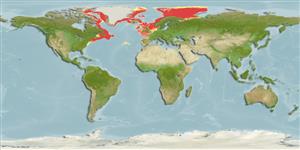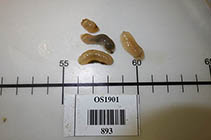Myriotrochus rinkii Steenstrup, 1851
| Native range | All suitable habitat | Point map | Year 2050 |

|
| This map was computer-generated and has not yet been reviewed. |
| Myriotrochus rinkii AquaMaps Data sources: GBIF OBIS |
Classification / Names Κοινά ονόματα | Συνώνυμα | CoL | ITIS | WoRMS
Holothuroidea | Apodida | Myriotrochidae
Environment: milieu / climate zone / εύρος βάθους / distribution range Οικολογία
; εύρος βάθους 2 - 720 m (Αναφ. 119490). Polar
Distribution Χώρες | Περιοχές FAO | Οικοσυστήματα | Παρουσίες | Εισαγωγές
Arctic, Northern Pacific and Northeast Atlantic.
Length at first maturity / Μέγεθος / Weight / Age
Γεννητική Ωρίμανση: Lm ? range ? - ? cm
Life cycle and mating behavior Γεννητική Ωρίμανση | Αναπαραγωγή | Γεννοβολία | Eggs | Γονιμότητα | Larvae
Main reference
Αναφορές | Συντονιστής | Συνεργάτες
Piepenburg, D., N.V. Chernova, C.F. von Dorrien, J. Gutt, A.V. Neyelov, E. Rachor, L. Saldanha and M.K. Schmid 1996 Megabenthic communities in the waters around Svalbard. Polar Biol. 16:431-446. (Αναφ. 2952)
IUCN Red List Status
(Αναφ. 130435: Version 2025-1)
CITES status (Αναφ. 108899)
CMS (Αναφ. 116361)
Threat to humans
Human uses
| FishSource |
Εργαλεία
Περισσότερες πληροφορίες
Σύσταση δίαιτας
Κατανάλωση τροφής
Θηρευτές
Διαδικτυακές πηγές
BHL | BOLD Systems | CISTI | DiscoverLife | FAO(Publication : search) | Fishipedia | GenBank (genome, nucleotide) | GloBI | Gomexsi | Google Books | Google Scholar | Google | PubMed | Δέντρο Ζωής | Wikipedia (Go, αναζήτηση) | Zoological Record



